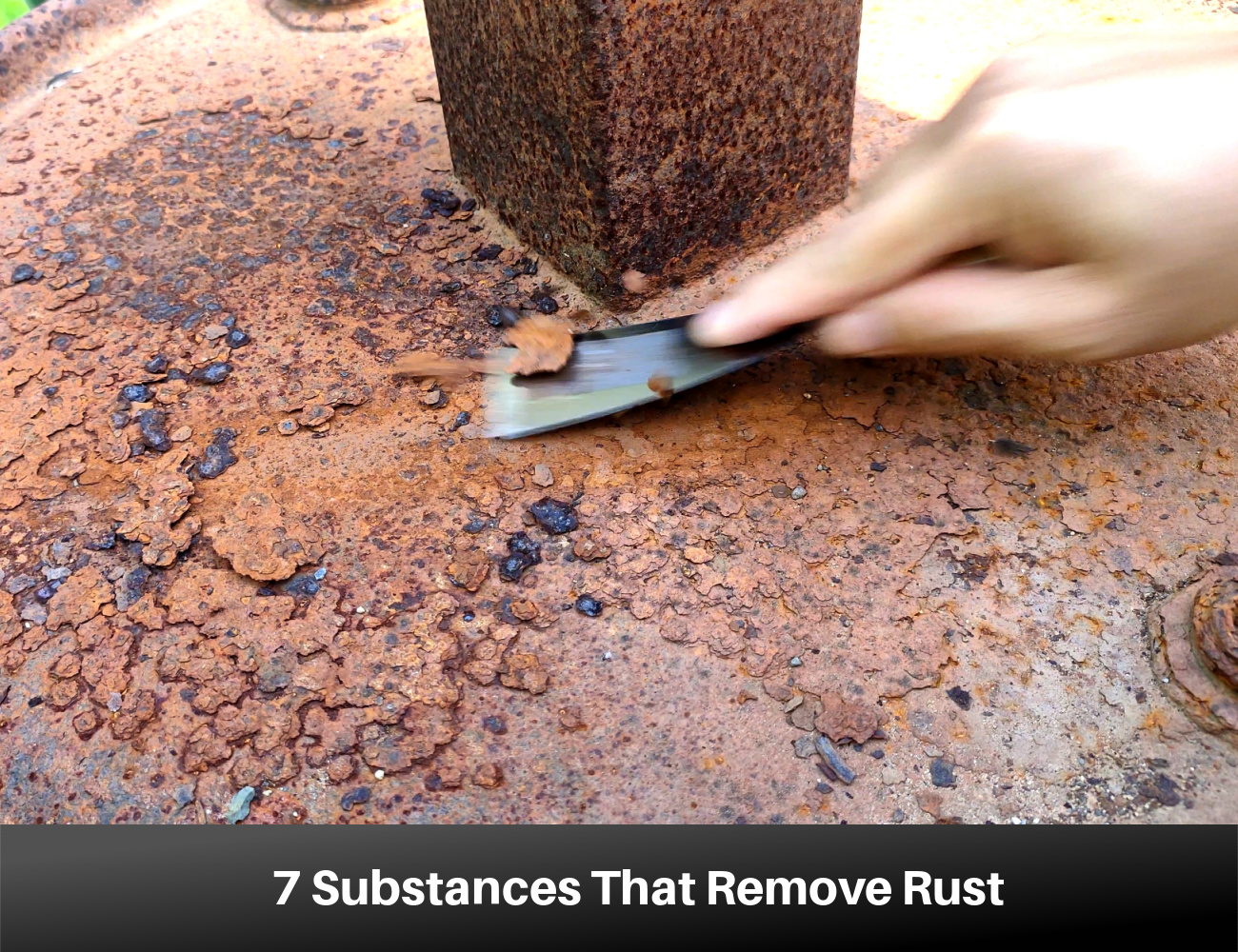Remove rust from metal with one of these seven substances you already have in your house. Rust is a chemical reaction that happens when iron interacts with oxygen and water. Although it’s typically harmless to humans, severe rust can corrode metal, rendering it useless.

If you have a metal item that you can’t handle losing, don’t worry -unless severe, there’s a good chance you can save it. Use this guide for all you need to know about how to remove rust from metal.
7 Substances That Remove Rust
These substances can help you remove rust from metal with ease. Start with the gentler methods before moving on to more harsh methods like oxalic acid.
1. WD-40
- Best For: Iron, Chrome, and Stainless Steel. Use it outside on tools, chains, nuts, and bolts.
The lubricating qualities of WD-40 can loosen rust, allowing you to scrub it off. To remove rust with WD-40, spray it on your object, allow it to sit for 15 minutes, and scrub it off with a brush or abrasive cleaning pad.
In addition to removing rust, WD-40 also prevents rust, making it a great solution for outdoor metal, like the tools you store in your garage.
2. Baking Soda
- Best For: Small amounts of rust on household surfaces and jewelry.
Baking soda is a gentle rust remover. Mix it with water to create a thick paste you can spread over metal to clean the rust. Allow the paste to sit for about an hour, and then use a microfiber cloth to scrub the metal before rinsing it with water and drying it.
3. Vinegar
- Best For: Minor to moderate rust stains on metal and items that you are able to submerge.
Vinegar is highly acidic, making it a great rust and household cleaner. To use vinegar to remove rust from metal or cast iron, fill a sink or tub with white distilled vinegar and submerge your rusty item. Allow the piece to sit in the vinegar until the rust starts to lift, or about 12 hours.
After 12 hours or when the rust lifts, dump the vinegar solution and create a baking soda paste with baking soda and water. Use a microfiber cloth to scrub the metal with the baking soda paste, rinse, and dry.
4. Citric Acid
- Best For: Metal tools, metal pots and pans, cast iron, and pieces that you can submerge in a sink or tub.
Citric acid comes from citrus fruits. It has a high acid content, making it one of the fastest ways to remove rust from metal. To use it, mix the citric acid powder with water according to the instructions on your package. Place your citric acid in a sink or tub, and submerge your metal item.
Check your item every 30 minutes to see if the rust is lifting. Since citric acid has a higher acid content than vinegar, it takes less time to remove rust from metal. Scrub the item with a soft-bristled brush, rinse, and dry.
5. Lemon
- Best For: Small rust spots on metal.
Lemon and salt will remove small rust spots. Start by moving your metal object to a counter or kitchen sink. Then sprinkle the rusty area with salt. Cut your lemon in half and rub the exposed area on the rust stain.
Allow the lemon and salt mixture to sit for two hours before wiping it off. If rust persists, repeat the process.
6. Potato And Soap
- Best For: Minor rust spots, kitchen utensils, and delicate metal pieces.
Potatoes contain small amounts of oxalic acid, making them suitable rust removers. For this method, cut a potato into two pieces and apply dish soap on the cut end. Use the potato as you would a sponge to remove the rust.
You may need to leave the potato on the item for a couple of hours for the agent to activate and remove the rust. Afterward, rinse and dry.
7. Oxalic Acid
- Best For: Rust that doesn’t come off with other methods. Use on strong, durable metals only.
Oxalic acid is a strong chemical agent you should use as a last resort. Some of its most common uses include removing rust from swimming pools and metal buildings.
You can buy oxalic acid online or at hardware stores. Since it’s toxic, use it outdoors only and follow all safety precautions.
How To Remove Rust From Different Metal Objects
You can buy or rent sanders or machinery to help with rust removal on large objects like buildings. Ask a contractor or someone at the hardware store if they can guide you in the right direction.
Combine this method with a rust-removing agent for maximum effectiveness.
There are certain rust-removal methods that work better for certain objects. For example, you don’t want to use oxalic acid on jewelry.

Tools
The best method to remove rust from metal tools is WD-40, citric acid, or vinegar. You can try vinegar or citric acid for tools that are small enough to submerge. Use WD-40 for the rest.
Furniture
Since you can’t submerge metal furniture, try lemon juice or baking soda to remove rust. You can create a paste using both, scrub it on, and let it sit for about an hour. Then use a soft brush to remove it, rinse, and dry.
Utensils
It’s common for metal utensils and knives to develop rust – clean it off with a potato. You can stab knives inside a potato and let them sit for an extended period of time to remove rust.
Soaking kitchen utensils in vinegar or citric acid will also remove rust. Just be sure to check on them periodically so they don’t soak for too long.
Jewelry
Since jewelry is delicate, it requires a more gentle rust removal method like baking soda. Avoid using strong acids on dainty jewelry.
Frequently Asked Questions (FAQ)FAQ
What Is The Fastest Way To Remove Rust From Metal?
This depends on what type of metal object you are trying to remove rust from. One of the best ways to remove rust from objects you can soak is to soak them in vinegar. This is a tried and true method.
As for larger objects that can’t be submerged, you can try spraying a vinegar mixture on the metal or using a rust-removing spray. Just make sure you let it soak for a while before rinsing it off and don’t leave any residue.
Does WD-40 Remove Rust?
In short, yes, WD-40 removes rust. It is a wonderful substance that specializes in not just removing the squeak from doors and cabinets, but also in removing all sorts of rust from metal objects in particular.
It’s important to always test the WD-40 out before going for the win. Because WD-40 is a strong substance, there is a possibility it can remove more than one layer from the metal, including finishes. So always test it.
How Do You Remove Rust Without Damaging Metal?
Most rust-removing products won’t damage metal, but in certain cases, problems can arise. If you care about damaging your metal, then you can always start with the weakest products before progressively moving up.
For example, baking soda and water are some of the weakest and least potent methods. So start there. Then, go with vinegar in short bursts followed by vinegar that soaks a long time, then WD-40 and other chemicals.
How Do You Remove Rust From Stainless Steel Furniture?
Because you can’t submerge furniture in vinegar (because that would take a lot of vinegar) in order to clean stainless steel furniture, you have to try a different method. But you can still use the all-powerful vinegar.
Start by rinsing the rusted part of the furniture with vinegar and let it rest for about ten minutes. More if the rust is deep. If you want to add a bit of a scrubbing agent you can add baking soda or salt, with salt absorbing less of the vinegar.
What Is A Good Rust Remover For Metal?
While WD-40 is always a solid choice, you may be tired of hearing about it by now. So instead, let’s talk about a few other options that are also solid and can do you well in your journey to remove rust from metal.
Rust-Oleum Rust Reformer is a good option and from a trusted brand. But if you can’t find it, both Evapo-Rust and CLR are available on Amazon. Yes, CLR is still a trusted and effective rust remover, just use it with caution.
When The Metal Is Too Far Gone
Sometimes metal is too far gone to save. If the rust is so bad the item is corroded and has holes, you might be better off with a replacement.


